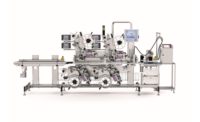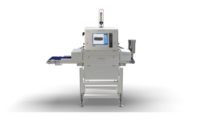Ensuring meat safety and regulatory compliance through Anritsu’s Comprehensive Solutions for Inspection and Detection

At a time of already-thin margins when a recall can cost a company not only its reputation but its entire business, meat processors know that anything that comes between product safety and quality and the consumer will impact their operation – even the smallest thing. Accurately detecting foreign material contaminants while maintaining a high-volume, high-speed, efficient line from raw material to packaging is crucial for today’s protein processors who must be proactive and preventive rather than reactive, while maintaining their throughput and efficiency.
Anritsu offers turn-key solutions including X-Ray, Checkweigher and Metal Detection and Combination systems that processors can deploy throughout their facility to detect physical contaminants like bone, stone, metal or glass, discover missing items and ensure quality of both raw and pre-packaged, case-ready meat products. Such detection solutions also help processors as they face more stringent government standards through the Food Safety Modernization Act (FSMA) and accordingly look for new inspection capabilities.
“In their unique place in the farm-to-table chain, processors are a gateway between raw material and the consumer. Their line is the front line of safety in many ways, and a complete advanced inspection system keeps problems from crossing that line,” said Erik Brainard, President and CEO of Anritsu. “We’re constantly working on new technologies and innovations to help meat processors improve product safety and compliance and ensure that physical contaminants don’t damage their processing equipment. At the same time, we know they are looking for a better ROI and a lower total cost of ownership.”
Early in the process, meat companies can prevent issues down the line by detecting large contaminants like metal, wire, bone or broken needle pieces. A combination of Metal Detectors and X-Ray systems are effective in finding contaminants before they move into the further processing phase and are ground into smaller, harder-to-discover pieces. Detection technology is also useful in the inspection of incoming frozen meat blocks.
During the further processing stage, very small contaminants can be detected through advanced X-Ray and Metal Detection. The sophisticated detection equipment from Anritsu can find tiny bone fragments in ground meat, in chub packaging with metal clips and ¼” thin patties, and detect minute foreign objects even in the spices that have been supplied to a processor for value-added products. “Anritsu offers more proven solutions for hard-to-detect bones than anyone else in the industry,” added Brainard.
Anritsu’s HD X-Ray inspection can detect calcified beef/pork bones or fragments from 1.0mm to 2.00 mm; its Ultra HD technology can detect contaminants as minute as 0.2mm diameter ferrous, non-ferrous and stainless steel spheres at production line speeds. The DualX system also provides value in the enhanced detection of low-density contaminants in products where bone, stone, ceramic, glass and even wire might enter the process.
Anritsu's Metal Detectors provide another point of inspection and detection for foreign materials during both further processing and finished product inspection. The company’s industry-leading Dual Wave Metal Detection System maximizes detection of both ferrous and non-ferrous metals through the ability to set two simultaneous frequencies, essentially offering two metal detectors in one unit.
At the finished product stage, Checkweighers are used to validate the weight of the individually packaged product. Anritsu offers more than 150 Checkweigher systems, along with a combination Metal Detector-Checkweigher system. The company’s Smart Measure Function provides a versatile, flexible way to decrease false rejects and reduce product giveaway to increase ROI.
Complementing innovative equipment, Anritsu offers a lifecycle management program called Performa360™ that gives processors the tools, support and training to diagnose and run their products in the best, most efficient way. That lifecycle management program also includes yearly meat inspections to help processors comply with HACCP.
Most recently, to provide a more comprehensive, integrated solution for meat processors, Anritsu developed a proprietary four-step process called Detection360 that precisely detects risks associated with product contaminants and missing items through X-Ray, Checkweighing, and Metal Detection solutions. The Detection360 process includes four key phases to help processors gauge their needs and determine the solutions that work for their own operations and products:
- Discovery Phase, which determines a processor's goals, process, packaging, and end user
- Mapping Phase, in which inspection technology is mapped through detailed, and accurate detection estimates
- Integration Phase, where Anritsu integrates solutions from its broad range of standard and semi-custom equipment
- Performance Phase, which involves integrating technology with Anritsu's basic and advanced training, preventative service programs, and operational equipment review.
Visit SeeMeatDifferently.com to watch the video and learn more.
For more information, visit DetectionPerfection.com.
Looking for a reprint of this article?
From high-res PDFs to custom plaques, order your copy today!





